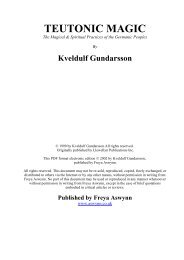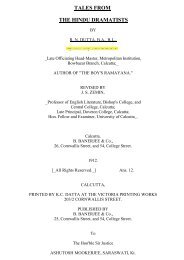Untitled - Awaken Video
Untitled - Awaken Video
Untitled - Awaken Video
You also want an ePaper? Increase the reach of your titles
YUMPU automatically turns print PDFs into web optimized ePapers that Google loves.
Chapter 6. The Sky 146<br />
to a religion worshiping an all-powerful God was a byproduct of their worldview.<br />
In the early Christian way of thinking, the entire Universe was created and supported/<br />
maintained by a single God who, in spite of delegating some power to other<br />
beings like angels, saints, etc. for various trivial reasons, was the absolute, and sole<br />
authority over heaven and earth. The Heathen definition of a God, if one can be<br />
put together, was a being who was powerful and knowledgeable about the World<br />
Tree, its function and all its inhabitants, and who could play direct or indirect<br />
roles in the preservation of It right up to the Ragnarök. To the Heathen, a God<br />
was like a king whose kingdom was the entire Tree, Lærað, and whose authority<br />
over the inhabitants of Midgard was as parents to children: loving, strict, but not<br />
over-bearing. If a Heathen felt that one God had interfered too much in the affairs<br />
of his life, he, as often children do, rebelled, sometimes even changing his allegiance.<br />
Egil Skalla-grimson, the famous Icelandic poet, warrior, and general rogue, in a<br />
poem known as the Sonatorek (“The Wreck of the Sons”), laments his often blind<br />
trust in Óðínn but considers the burden of his sons’ deaths his own rather than<br />
blaming his patron God:<br />
“And then I think of Óðínn:<br />
A branch was torn from my tree,<br />
But Óðínn bore it away<br />
To the high halls of the Gods.<br />
This God has been good to me.<br />
Yet I trusted Him too much<br />
And more than was good for me,<br />
For He did allow that death.<br />
Still, I sacrifice to Him–<br />
Not eagerly, but because<br />
He gave me my two great gifts<br />
And they salve my heaviest hurts.” 7<br />
Within 150 years of Egil’s death, the above poem, had it been written about the<br />
God of the Christians, would have been considered a blasphemy and, consequently,<br />
punishable under canonical law.<br />
7 Fell, Christine, tr., Egil’s Saga (Everyman’s Library; London, UK)1975, pp. 148-48.
















